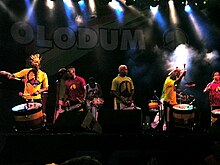Olodum

Olodum is a Brazilian music group that takes part in the Salvador da Bahia Carnival and performs stage appearances in a smaller formation. The name is borrowed from the religion of the Yoruba in Nigeria . The band has recorded several successful CDs. Olodum is also a cultural association that is committed to Afro-Brazilian culture and social concerns of the black population of Salvador.
meaning
Olodum is one of the best-known Sambareggae groups and has had a significant impact on this music. The music group was founded in 1979 as bloco afro based on the model of Ilê Aiyê and from the beginning linked music with political demands for equal rights for the black population. The cultural center of Olodum is located directly on Pelourinho , the historic center of the old town of Salvador.
In addition, the Olodum School exists as a social project. There, children from the underprivileged classes of Salvador receive free lessons in drumming, dancing, music, but also, for example, computer science. This school, which also carries out political education, is financed by the band's income, grants and donations. The group also publishes the monthly newspaper, Bantu Nagô , and runs a factory that makes clothes and musical instruments. Every Tuesday, Olodum organizes the Afrikan Bar , where the group performs open-air in the evenings (for a fee) and plays to dance.
In 1987 Olodum had a hit with "Faraó" (on the debut album Egito Madagáscar ). In 1989 the band performed for the first time in Europe. Her fifth album A Música do Olodum from 1992 contained the hit "Nossa Gente", which Roque Carvalho wrote and which was covered by Caetano Veloso and Gilberto Gil on their Tropicália 2 CD . Olodum's album Sol e Mar was recorded live at the Montreux Jazz Festival in 1995.
In addition to 20 of his own records and CDs, Olodum recorded the piece The Obvious Child with Paul Simon on his album The Rhythm of the Saints in 1990 , and in 1995 Michael Jackson recorded the single They Don't Care About Us with the group, which was also part of the eponymous Video of Spike Lee can be seen. Jackson wears several Olodum t-shirts in the video for his hit They Don't Care About Us . Olodum was also involved in the recording of Beth Carvalho , Daniela Mercury and Jimmy Cliff . Olodum also played the drum rhythm for recordings by Wayne Shorter and Herbie Hancock on the compilation Bahia Black - Ritual Beating System by Bill Laswell . In 2014, Olodum played (alongside Jennifer Lopez and Claudia Leitte ) in the FIFA World Cup song by Pitbull .
literature
- Petra Schaeber: The power of the drums. The cultural movement of the black carnival groups from Salvador / Bahia in Brazil. The example of the Grupo Cultural Olodum Online Dissertation FU Berlin, 2003
